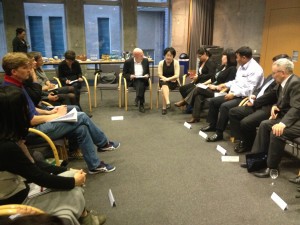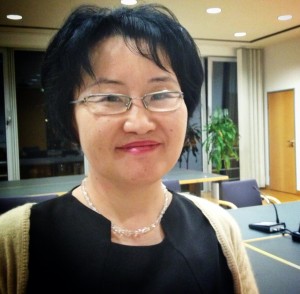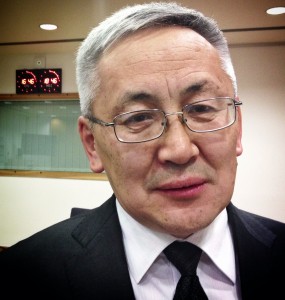In dialogue with Mongolian media
 A list of forbidden words; newspapers influenced by politicians; and in the capital Ulan Bator, Mongolian journalists refrain from criticizing their colleagues because all journalists know each other.
A list of forbidden words; newspapers influenced by politicians; and in the capital Ulan Bator, Mongolian journalists refrain from criticizing their colleagues because all journalists know each other.
At a recent DW Akademie Media Dialogue in Berlin, a group of visiting journalists, editors and media experts from Mongolia gave an insight into media development in their country.
German journalists attending were keen to find out about press freedom in Mongolia; who exactly owns private media; and, what progress is being made towards press industry self regulation.
It was also another opportunity for the visiting Mongolian journalists to compare journalistic practices and media regulation between Germany and Mongolia.
Following the end of the Soviet era, Mongolia introduced a number of laws to make reforms in public broadcasting, freedom of information and to prevent media censorship.
In 2010, Reporters without Borders ranked Mongolia in its Press Freedom Index at 76. This year Mongolia was ranked 98.
One topic that generated a lot of discussion was the so-called “list of forbidden words”. Journalists explained how Mongolia’s Communications Regulatory Commission (CRC) is under strong political pressure to make media organizations use software to filter or hide “forbidden words” in online reader comments that are critical of government or insulting.
To explore how Mongolia’s media is developing, onMedia spoke with Munkhmandakh Myagmar, Executive Director of the Mongolian Press Institute; and, Tserenjav Demberel, Executive Director of Transparency Foundation Mongolia, and a blogger on media issues.
Can you describe for us the political influence in Mongolia’s media?
MM: Not all the media, but the majority of Mongolian media are strongly influenced by politicians. In a way that politicians invest in media not for business purposes but for manipulating the public to propagate their own interests. In Mongolia, I think the media are for this reason detached from the market. The development is not going based on market principles because the media does not survive on revenues from advertising or sales, instead the media exists based on financial support or subsidies from politicians. In turn they are obliged to provide information that is wanted by politicians. This makes journalism in Mongolia extremely unhealthy. Media literacy is also not so high. Citizens can not distinguish between advertising and journalistic stories, and they are not in a situation to critically discuss journalistic stories.
Self regulation of the press – is that Mongolian media wants?
MM: Some of the media are becoming aware that self responsibility is one of the ways to survive because your credibility and reputation are at stake. Media credibility is decreasing and if you want credibility you need to be responsible. But this is the beginning, and for this reason in the last couple of years there are strong discussions about the need for media regulation and ways to establish it.
What does the government want? Do they wish to maintain influence or control over the media?
MM: I have an impression that the politicians do not have a will to really develop a strong, democratic, pluralistic, independent media. They still have an interest to use the media as their own propaganda tools. For example, there was a draft law on media freedom in Mongolia discussed last Spring in parliament. Many members of parliament own media and those media owners do not want to loose their tools of propaganda. The draft law had a provision about editorial independence of media. The provision said media owners can not interfere in daily editorial work. MPs sitting and discussing this law protested against this provision. So I would say there is no political will to really develop independent media. There are some progressive members of parliament, a few, but not all of them.
What changes do you think are necessary for more openness and transparency in Mongolian media?
TD: I think Mongolia’s media is developing in its natural way. But in order to support this development I think we have to see the media as a business. And like other businesses we have to make it transparent. For example: who owns the media? What are the revenues? How many copies are sold? If we make it transparent, the media will develop according to market economy principles.
Why is it not so clear in Mongolian media as to who owns what?
TD: It’s not only in the media sector, but in general in the Mongolian economy, all businesses are in a closed environment. In other countries you can learn who is doing what business, who owns what, who invested how much money, annual revenue and so on. There is also a conviction that the media is not an ordinary business, but something outside of the business world.
Mongolia is rich in minerals such as copper, coal and gold. What role and influence are foreign mining companies playing in Mongolian media?
TD: There are two kinds of influences upon the media. Mining companies on the one hand provide sponsorship to the media to a great extent. On the other hand, mining companies bring a culture of professional communication with the media.
Is that good?
TD: It’s good in that it brings a culture where all international companies communicate with the media on a professional level. But, because the media are not ready for this kind of communication with organizations such as mining companies, the whole relationship between the media and the mining companies turns into something that can be called ‘irresponsible media’. For example, the media takes money from a mining company and instead of publishing [material] as advertisements, they produce hidden advertisements – like a mixture of journalistic stories and advertisements.
Interviews: Guy Degen






Feedback